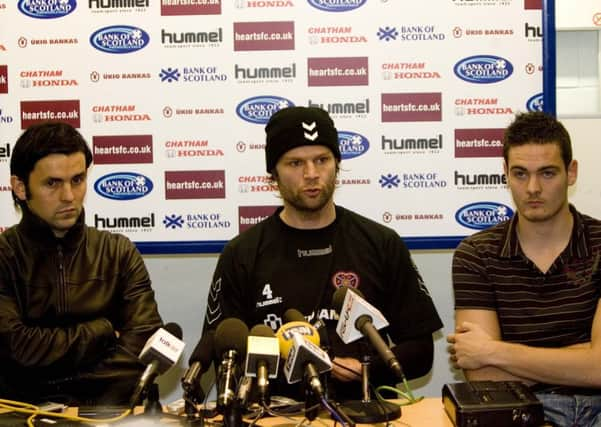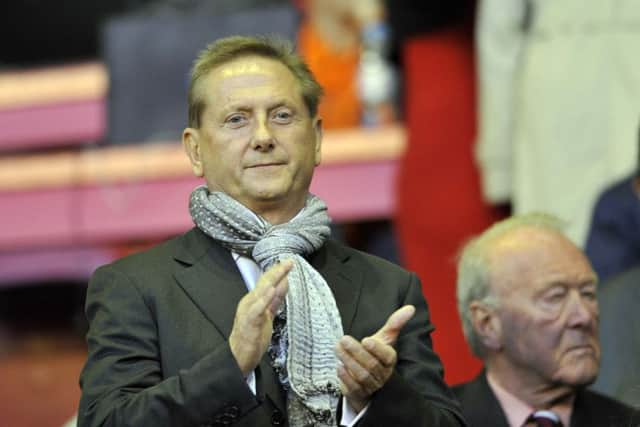RICCARTON THREE: Hearts trio's rebellion against Vlad ten years on


That seminar room – since demolished to make way for Scotland’s Oriam performance centre – was packed with journalists. The scheduled press call to preview the following day’s match against Dunfermline was to be Eduard Malofeev’s first as interim head coach of Hearts. There was already huge interest, but Pressley, Hartley and Gordon hijacked it to declare mutiny at the Edinburgh club in a carefully-worded statement.
Anger at then-owner Vladimir Romanov was searing. However, Pressley was the epitome of calmness delivering his words. Hartley and Gordon sat on either side of their captain looking sullen, almost ashamed that it had come to this. Pressley was the only one who spoke. He talked of “problems”, of “the correct values and discipline”, of “an impossible task” and, finally, of “significant unrest in the dressing room”.
Advertisement
Hide AdAdvertisement
Hide AdRomanov had reduced Hearts to a circus, sacking three managers and sending the other, Valdas Ivanauskas, to a health spa to reduce stress levels. There were eastern European medics using golden sticks, players being frozen out of the team, and a fax machine used so much it was in danger of burnout. Malofeev was meant to steer the ship in Ivanauskas’ absence, but he couldn’t organise a prayer in a church. He didn’t even speak English.


Pressley spoke out as a last resort in the hope that Romanov and the Hearts board would listen to players’ disgruntlement. It ultimately cost him his Tynecastle career. Two months later, he was stripped of the captaincy and told he no longer had a future there after eight years - five of them as skipper.
Ten years since that momentous day, those involved recall why such an unprecedented step was taken. “There were things happening in the background and the place was an absolute shambles,” said Robbie Neilson, who sat in the dressing room with the rest of the Hearts players while Pressley, Hartley and Gordon faced the media. Malofeev remained upstairs and didn’t appear.
“There was stuff going on and decisions being made that defied belief. It had come to a point. We’d spoken a lot as a group, especially the Scottish players. We knew what should be getting done, the way it was before and what we weren’t happy about.
Advertisement
Hide AdAdvertisement
Hide Ad“Elvis made the decision and we had a chat about it. He asked Paul and Craig to go in with him. It was the crossing of the Rubicon. As soon as you did that there was no way back. It opened things up for everyone to see what was actually going on. It was a great decision by Elvis to come out and say it.


“He paid the price because he got put out [of the club] and moved on. You always look back and think he stood up for what he believed was right and what we all believed was right. As a captain, he made that decision and was quite happy to be open about it.
“The rest of us were all sitting in the dressing room. Paul and Craig went in as the senior international players. Once the statement was delivered we had a chat and then went out and trained. We moved on until everything blew up.”
Romanov, pictured, was inside the building that day. He confounded the madness by telling the Hearts first-team squad that they would all be sold to “Kilmarnock or whatever club will take them” if they failed to beat Dunfermline the following afternoon. The score was 1-1, but of course he couldn’t actually execute that threat.
Advertisement
Hide AdAdvertisement
Hide Ad“If you’d kept a diary you’d have a decent movie,” continued Neilson. “It was a crazy place at the time with a lot of mental stuff going on. When it all started [with Romanov] we were told this and that was going to happen but, even as a player, you’re thinking: ‘It can’t last.’ Thankfully it’s all in the past now. The club is in a good, stable place, run by professional people who are doing things right.”
Pressley explained why he spoke out. “The treatment of some individuals during that period of time was horrendous. The honesty, the transparency - all the things I think are really important in the foundations of football club - were being disregarded,” he told a recent BBC documentary.
“It got to the point where I felt I had to speak out on behalf of all of these people. At no time did Vladimir ever come and face my after I made that statement. I don’t think he had the courage to face me. I felt let down. I’d gone from being a captain there for many years to being exiled. But, again, the amazing thing was: The day I was told I no longer had a future at Hearts, I was also offered the assistant manager’s job.”
That last sentence sums up the chaos around the club back then. Lawrence Broadie worked in the marketing and communication department and was responsible for arranging press conferences.
Advertisement
Hide AdAdvertisement
Hide Ad“None of us had any sense the players were going to do that. Clearly, it was a huge shock because it’s happening on your watch,” said Broadie, now owner of Electrify Marketing and Communications. “Immediately after that press conference, myself and Clare Cowan [then-communications manager] spoke to the head of communications, David Southern, who was on holiday. It was a case of: ‘Sorry to interrupt your holiday. Got a slight problem here.’
“Thankfully there was a degree of understanding from the owner that the marketing and communications department weren’t responsible for what happened. Steven Pressley, if I remember right, apologised to us that we had been put in that position.
“At the time you think: ‘This is incredible, this is awful.’ But when you consider what went on in subsequent years, it maybe doesn’t have quite the same degree of significance.
“At the time, the whole world saw this. Three senior players in front of the press reading a prepared statement. There was a total sense of panic. You think the world is coming to an end, but actually the challenges became more difficult as the years went on. People not being paid wages and things like that were just horrendous.”
It is fair to say that Heart of Midlothian today are an accurate reflection of the values Pressley, Hartley and Gordon stood up for ten years ago.